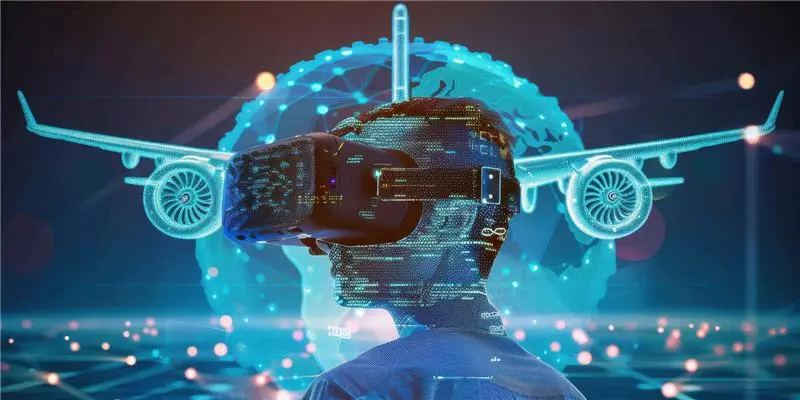The travel industry has undergone a significant transformation, fueled by cutting-edge technologies. As we explore travel technology, we uncover the trends, challenges, and opportunities that shape its landscape.
- Significance for Businesses in Tourism & Travel: Travel technology plays a vital role in enhancing the performance of businesses. It has the ability to simplify processes, automate tasks, and improve customer experiences. By utilizing technology, businesses can lower expenses, improve efficiency, and ultimately boost profitability. The integration of travel technology is a smart decision to enhance productivity and stay ahead in the market.
- Keeping Pace with Trends: A Business Imperative: It is of utmost importance for businesses to stay updated with the latest travel technology trends. The competitive landscape demands constant innovation, and falling behind in technology adoption may give competitors a significant advantage. Not meeting evolving customer expectations may lead to negative reviews, which can tarnish a brand's reputation. Thus, staying current with the latest trends in travel technology is not just an option, but a crucial business imperative.
- Catalysts for Latest Travel Tech Trends: There are various reasons responsible for the development of travel technology trends. These include the increasing popularity of voice search and augmented reality, as well as the COVID-19 pandemic, which has promoted the adoption of contactless solutions. These factors have a significant impact on consumer behavior, and consequently, they drive technological advancements within the travel industry.
- Sustainable Technology Trends in Travel: Sustainability has become a crucial aspect of modern travel technology trends. The industry is moving towards eco-friendly solutions, such as sustainable fuel for cruise ships and renewable energy in the hospitality sector. This shift towards green technologies not only aligns with environmental concerns but also resonates with an increasingly conscientious traveler demographic.
- Artificial Intelligence (AI) in Travel: Artificial Intelligence (AI) has become increasingly prevalent in the travel industry, providing a range of solutions from chatbots for customer service to intelligent data analysis. AI helps to personalize experiences, improve revenue management, and contributes to the overall enhancement of services. It's important to note that AI is not solely about robots; it's a multifunctional tool that impacts various aspects of the travel business.
- The Role of Big Data: The travel industry is being revolutionized by Big Data. Companies are using large datasets to personalize their offerings, forecast demand, and optimize pricing strategies. By analyzing Big Data, businesses can gain valuable insights into their performance and trends, which can help them make informed decisions and strategic plans.
- Robotics Technology Transforming Hospitality: Robotic technology, which was once considered a concept of the future, has now become a reality in the travel industry. Robots are being used in various roles such as hotel concierge, luggage handling, and cleaning services, to enhance efficiency and reduce human-to-human contact. The COVID-19 pandemic has accelerated the adoption of robotic solutions for safety and hygiene purposes.
- Voice Search & Control: The proliferation of voice-activated devices has elevated the relevance of voice search in the travel industry. Customers increasingly use voice search for booking flights, hotels, and experiences. The integration of voice control within travel experiences, such as hotel rooms, is also gaining prominence, offering convenience and accessibility.
- Augmented Reality (AR) Enhancing Experiences: Augmented Reality (AR) enhances customer experiences by overlaying digital information onto the real world. From interactive travel apps to augmented photographs and real-time information, AR is reshaping how travelers engage with their surroundings, providing a new layer of immersion.
- Virtual Reality (VR) Redefining Exploration: Virtual Reality (VR) is a game-changer in the tourism industry, allowing travelers to virtually experience destinations before booking. VR tours provide immersive glimpses into hotels, landmarks, and activities, offering a competitive edge to businesses that leverage this technology.
- Internet of Things (IoT) in Travel: The Internet of Things (IoT) fosters connectivity among devices, enhancing control and convenience. In hotel rooms, IoT facilitates centralized control of lights, heating, and air conditioning. Sensors in airports alert passengers about their luggage. The IoT's role in creating a smart and connected travel environment is expanding.
- AI Chatbots for Seamless Communication: AI-powered chatbots stand as intelligent assistants, providing swift responses to customer queries 24/7. As they continually learn from interactions, chatbots enhance customer service, particularly for common queries. Their adoption reflects a commitment to efficient, round-the-clock communication.
- ChatGPT Revolutionizing Interactions: ChatGPT, an AI-powered tool, is revolutionizing interactions in the travel industry. From answering user queries to generating entire articles, ChatGPT finds applications in customer satisfaction, cost reduction, booking experiences, personalization, and data analytics.
- Cybersecurity Measures for Protection: With the increasing risk of cyber-attacks, cybersecurity measures are paramount in the travel industry. The sector's vulnerability to data breaches necessitates robust measures, including employee training, hardware/software solutions, and compliance with data protection laws.
- Recognition Technology Enhancing Frictionless Interactions: Recognition technology, encompassing fingerprint and facial recognition, contributes to seamless interactions. From room access in hotels to contactless check-outs, recognition technology removes friction from processes, promising enhanced user experiences.
- Metaverse, NFTs, and Contactless Payments: The metaverse, NFTs, and contactless payments are emerging trends with transformative potential. The metaverse enriches digital interactions, NFTs introduce unique digital assets, and contactless payments offer speed and convenience, especially in a post-pandemic landscape.
Conclusion: Navigating the Future of Travel Technology
As we navigate the future of travel technology, businesses must embrace innovation, adapt to evolving trends, and prioritize customer-centric solutions. The intersection of sustainability, AI, AR, VR, and IoT forms a roadmap for a tech-infused travel industry, promising enhanced experiences and operational excellence. Stay tuned for the continued evolution of travel technology, where each trend unlocks new possibilities and redefines the way we explore the world.



